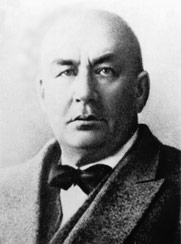Fyodor Shcherbatskoy: Difference between revisions
No edit summary |
m +DEFAULTSORT |
||
| Line 19: | Line 19: | ||
*[http://kfinkelshteyn.narod.ru/Tzarskoye_Selo/Uch_zav/Nik_Gimn/NGU_Sherbatskiy.htm Stcherbatsky's biography] (in Russian) |
*[http://kfinkelshteyn.narod.ru/Tzarskoye_Selo/Uch_zav/Nik_Gimn/NGU_Sherbatskiy.htm Stcherbatsky's biography] (in Russian) |
||
{{DEFAULTSORT:Shcherbatskoy}} |
|||
[[Category: |
[[Category:1866 births]] |
||
[[Category: |
[[Category:1942 deaths]] |
||
[[Category:Russian |
[[Category:Russian logicians]] |
||
[[Category:Russian Indologists]] |
|||
Revision as of 17:53, 9 August 2008

Fyodor Ippolitovich Shcherbatskoy or Stcherbatsky (1866-1942) was a Russian Indologist who, in large part, was responsible for laying the foundations in the Western world for the scholarly study of Buddhist philosophy.
Stcherbatsky studied in the famous Imperial Lyceum and later in the University of Saint Petersburg, where Ivan Minayev and Sergey Oldenburg were his teachers. In 1897, he and Oldenburg inaugurated Bibliotheca Buddhica, a library of rare Buddhist texts.
In 1903, returning from a trip to India and Mongolia, Shcherbatskoy started writing his Theory of Knowledge and Logic According to the Later Buddhists. In 1928 he established the Institute of Buddhist Culture in Leningrad. His Conception of Buddhist Nirvana (1927), written in English, caused sensation in the West. The main work in English, however, followed suit with the 2 volumes of the Buddhist Logic (1930-32), which have exerted immense influence on Buddhology.
Shcherbatskoy remained but little known in his country, but his extraordinary fluency in Sanskrit and Tibetan languages won him the admiration of Jawaharlal Nehru and Rabindranath Tagore. According to Debiprasad Chattopadhyaya, "Stcherbatsky did help us - the Indians - to discover our own past and to restore the right perspective of our own philosophical heritage." The 2004 Encyclopædia Britannica acclaimed him as "the foremost Western authority on Buddhist philosophy".
Links
External links
- The Scholarly Activity of Fyodor Stcherbatsky - an Epoch in World Buddhology (in English)
- Bibliotheca Buddhica (in English)
- Stcherbatsky's biography (in Russian)
